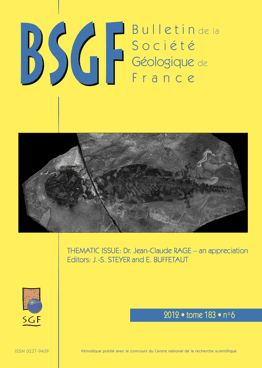
BSGF-Earth Sciences Bulletin
Scope & Guideline
Advancing Knowledge in Geology and Beyond
Introduction
Aims and Scopes
- Tectonics and Structural Geology:
This area encompasses the study of tectonic processes, structural evolution of mountain ranges, and the kinematics of fault systems. Research often includes analyses of seismic data and field studies to interpret geological structures and their histories. - Sedimentology and Stratigraphy:
The journal publishes research on sedimentary processes, stratigraphic sequences, and the interpretation of sedimentary rocks. This includes studies of depositional environments, sedimentary facies, and the impact of tectonic events on sedimentation. - Paleoenvironment and Climate Change:
Papers often explore paleoclimatic conditions and their effects on geological formations. This includes studies that connect geological records with climate events, contributing to our understanding of historical climate change. - Geochronology and Mineralogy:
Research in this domain focuses on dating geological events and understanding mineral formation processes. This includes radiometric dating techniques and the study of mineral compositions to decipher geological histories. - Hydrogeology and Natural Resources:
The journal covers research on groundwater dynamics, hydrocarbon reservoirs, and mineral deposits. This includes studies that assess the impacts of geological processes on resource availability and environmental sustainability.
Trending and Emerging
- Climate Change and Geological Impact:
Recent papers increasingly address the interplay between geological processes and climate change, highlighting how past climate events have influenced sedimentation and tectonics. - Geophysical Methods and Techniques:
There is a rising trend in the use of advanced geophysical techniques, such as seismic reflection and electromagnetic methods, to study subsurface structures and processes, reflecting technological advancements in the field. - Geological Modeling and Simulation:
Emerging themes include the use of numerical modeling to simulate geological processes, which aids in understanding complex interactions in tectonics and sedimentation, demonstrating a shift towards computational approaches in geology. - Natural Hazards and Risk Assessment:
An increasing number of studies focus on assessing natural hazards, such as landslides and seismic risks, indicating a growing awareness of the need for geological research to inform disaster preparedness and mitigation strategies. - Interdisciplinary Approaches in Earth Sciences:
There is a noticeable trend towards interdisciplinary research that integrates geology with other fields such as archaeology, hydrology, and environmental science, reflecting a holistic approach to understanding earth systems.
Declining or Waning
- Paleontology and Fossil Studies:
Research on paleontological findings and fossil records has decreased, suggesting a shift away from traditional paleontological studies towards more contemporary geological processes and their implications. - Anthropogenic Influences on Geology:
Studies focusing on the impact of human activities on geological formations and processes appear less frequently in recent issues, indicating a potential waning interest in this interdisciplinary approach. - Geological Heritage and Conservation:
There seems to be a decline in publications addressing geological heritage and conservation issues, which may reflect a broader trend in environmental studies moving towards more applied sciences.
Similar Journals

GEOLOGIA CROATICA
Empowering Geoscientists with Accessible KnowledgeGEOLOGIA CROATICA is a distinguished open-access journal published by the Croatian Geological Survey, dedicated to advancing the field of Earth and planetary sciences. Since its inception in 1992, this peer-reviewed journal has become an essential resource for researchers, professionals, and students interested in various aspects of geology. With its robust impact factor and a prestigious place in Scopus rankings, ranking 127th out of 321 in Geology and 77th out of 159 in miscellaneous Earth and Planetary Sciences as of 2023, GEOLOGIA CROATICA maintains a strong international presence. It provides a platform for the dissemination of critical research findings, promoting collaboration and knowledge sharing among the global scientific community. By focusing on high-quality manuscripts that cover geological processes, hazards, and resources, this journal is pivotal for anyone looking to contribute to or expand their understanding of geological sciences. The journal's commitment to open access ensures that invaluable research is accessible to all, fostering a more informed and scientifically engaged society.
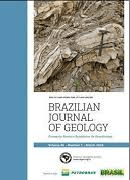
Brazilian Journal of Geology
Unveiling Brazil's Geological Heritage and InsightsBrazilian Journal of Geology, the flagship publication of the SOC BRASILEIRA GEOLOGIA, has been a beacon of geoscientific research since its inception in 2013. With an ISSN of 2317-4889 and an E-ISSN of 2317-4692, this open-access journal has facilitated the dissemination of high-quality research across various branches of geosciences, making it freely accessible to a global audience since 2014. Hailing from Brazil, the journal proudly holds a Q2 ranking in Earth and Planetary Sciences as of 2023, and ranks #73 out of 195 in Scopus, indicating its growing impact and relevance in the field. The Brazilian Journal of Geology aims to bridge diverse geological studies with interdisciplinary approaches, promoting the understanding and application of geology in addressing contemporary scientific challenges. As it converges research from 2013 to 2024, the journal not only enriches the academic landscape but also serves as a vital resource for researchers, professionals, and students eager to explore the complexities of the Earth and its processes.

GEOLOGICA ACTA
Advancing geological knowledge for a sustainable future.GEOLOGICA ACTA is a distinguished open-access journal dedicated to the field of geology, published by Universitat de Barcelona since its inception in 2003. With an impact factor that reflects its relevance in the academic community and a commendable Q2 ranking within the Earth and Planetary Sciences category, this journal is committed to disseminating high-quality research that spans various aspects of geological sciences. The journal's broad scope encompasses both theoretical and applied research, making it a vital platform for researchers, professionals, and students alike to share their findings with a global audience. With its Open Access policy, GEOLOGICA ACTA ensures that all published articles are freely accessible, fostering collaboration and innovation in the geological community. Based in Barcelona, Spain, at the Geociences Barcelona (CSIC), it plays a pivotal role in connecting scholars from diverse backgrounds and advancing the field of geology through rigorous peer-reviewed articles.
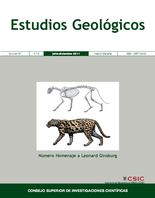
ESTUDIOS GEOLOGICOS-MADRID
Fostering Collaboration in Earth and Planetary Sciences.ESTUDIOS GEOLOGICOS-MADRID is a prominent journal in the field of geology, published by the esteemed Consejo Superior de Investigaciones Científicas (CSIC) in Spain. Established in 1976, this Open Access journal has been a vital resource for researchers and professionals since its inception. With an impact factor reflecting its contribution to the Earth and Planetary Sciences community, ESTUDIOS GEOLOGICOS-MADRID currently holds a Q3 category ranking in Geology as of 2023, showcasing its relevance and quality within the discipline. The journal publishes a diverse array of geological studies, ensuring wide-reaching access to significant research findings, thereby promoting collaboration and knowledge sharing. Established as a platform for both foundational research and applied geology, this journal fosters academic growth and contributes to understanding the Earth’s processes. Researchers, professionals, and students are encouraged to explore its extensive archive, which includes publications from 1976 to the present. For more information, visit the journal's editorial office at Editorial CSIC, C/VITRUVIO 8, 28006 MADRID, SPAIN.
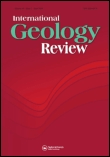
INTERNATIONAL GEOLOGY REVIEW
Connecting researchers to the forefront of geological innovation.INTERNATIONAL GEOLOGY REVIEW, published by Taylor & Francis Inc, is a premier journal dedicated to advancing the field of geology since its inception in 1959. With its Q1 ranking in the field of Geology for 2023, this journal is a significant platform for researchers, professionals, and students exploring the intricacies of Earth and planetary sciences. The journal has been rated in the 81st percentile within Scopus rankings, reflecting its influence and the high quality of articles published. Although it does not offer Open Access options, the journal maintains a rigorous peer-review process to ensure the publication of original and impactful research. With an extensive archive projected to continue until 2024, INTERNATIONAL GEOLOGY REVIEW serves as an essential resource for those seeking to deepen their understanding of geological phenomena, making it a vital contributor to the global scientific community.

ANNALES SOCIETATIS GEOLOGORUM POLONIAE
Illuminating the Depths of Earth Sciences.ANNALES SOCIETATIS GEOLOGORUM POLONIAE is a distinguished journal published by the Polish Geological Society, focusing on pivotal research in the fields of geology, economic geology, and stratigraphy. With an ISSN of 0208-9068, this journal has established itself as an essential platform for disseminating significant findings and advancements in geological sciences since its convergence in 2008. The journal proudly holds a Q2 quartile ranking in the categories of Economic Geology, Geology, and Stratigraphy as of 2023, indicating its respectable position within the global academic community. Researchers will find its indexed status in Scopus, ranking #138/321 in Geology and showcasing a solid presence in key geological sub-disciplines. While the journal is not open access, it remains a vital resource for professionals and students striving for insight into contemporary geological research. Located in Krakow, Poland, the journal continues to contribute significantly to the understanding of geological processes and resources, making it an indispensable reference for anyone in the field.
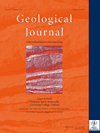
GEOLOGICAL JOURNAL
Fostering collaboration for a sustainable geological future.GEOLOGICAL JOURNAL, an esteemed publication by WILEY, has been at the forefront of geological research since its inception in 1951. With an ISSN of 0072-1050 and E-ISSN of 1099-1034, this journal serves as a vital platform for disseminating high-quality, peer-reviewed research in the field of geology. Operating out of the United Kingdom, the journal proudly features a Scopus rank of 80 out of 321 in the Earth and Planetary Sciences category, reflecting its commitment to scholarly excellence, with a 2023 category quartile ranking of Q2. As part of its innovative approach, GEOLOGICAL JOURNAL seeks to foster interdisciplinary collaborations, advancing our understanding of earth processes, materials, and history. Although it does not offer open access options, its robust subscription model ensures that both professionals and students have access to groundbreaking insights. With a publication history that spans over seven decades, the GEOLOGICAL JOURNAL continues to be an indispensable resource for the global geological community, encouraging discoveries that shape our comprehension of the planet.

Geosphere
Empowering Geoscientists with Unrestricted Access to KnowledgeGeosphere is a premier open access journal published by the Geological Society of America, Inc., dedicated to advancing the fields of geology and stratigraphy. Since its inception in 2005, this journal has established itself as a critical platform for sharing high-quality research, evidenced by its robust positioning in the 2023 Scopus rankings, where it holds the 12th rank in stratigraphy and 75th in geology. With an impressive impact factor and a commitment to open access since 2018, Geosphere facilitates the dissemination of significant findings to a global audience, making it an essential resource for researchers, professionals, and students alike. The journal's scope includes a wide range of topics related to Earth and Planetary Sciences, encouraging interdisciplinary collaboration and innovation. Based in the United States, Geosphere continues to foster a community dedicated to understanding the Earth's processes and resources, ensuring that it remains at the forefront of geological research.
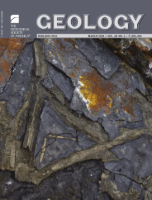
GEOLOGY
Unveiling the Mysteries of Our Planet's PastGEOLOGY, published by the Geological Society of America, Inc, is a premier journal dedicated to advancing knowledge, research, and discussion in the field of geology. With an ISSN of 0091-7613 and an E-ISSN of 1943-2682, this journal stands out with an impressive Q1 ranking in Geology for 2023, positioning it among the top journals in the realm of Earth and Planetary Sciences, specifically holding a remarkable rank of 11 out of 321, reflecting its 96th percentile status. This journal aims to publish innovative research articles that cover all aspects of geology, from tectonics and sedimentology to paleontology and mineralogy, offering invaluable insights for researchers, professionals, and students alike. Although not currently open access, GEOLOGY maintains a rigorous review process ensuring the quality and integrity of the research it publishes. For more than five decades, spanning from its inception in 1973 to the upcoming publications in 2024, GEOLOGY has been instrumental in shaping the geological discourse and continues to be a vital resource for the scientific community.

JOURNAL OF THE GEOLOGICAL SOCIETY OF INDIA
Pioneering research for a sustainable geological future.JOURNAL OF THE GEOLOGICAL SOCIETY OF INDIA, published by Springer India, serves as a pivotal platform for researchers and practitioners in the field of geology. Established in 1979, this journal has been instrumental in advancing geological research throughout India, showcasing both regional studies and cutting-edge global research. With its Category Quartile ranking of Q3 in the geology category for 2023, and a significant Scopus rank of 171 among 321 journals in Earth and Planetary Sciences, it remains a respected source of scholarly activity. The journal is dedicated to the dissemination of original research articles, reviews, and case studies that encapsulate the dynamic scope of geological science, thus contributing to the understanding of geological phenomena. Although currently not offering open access, the journal maintains a commitment to high-quality scholarship and aims to engage a diverse readership, enhancing the knowledge and practice of geology across various disciplines.